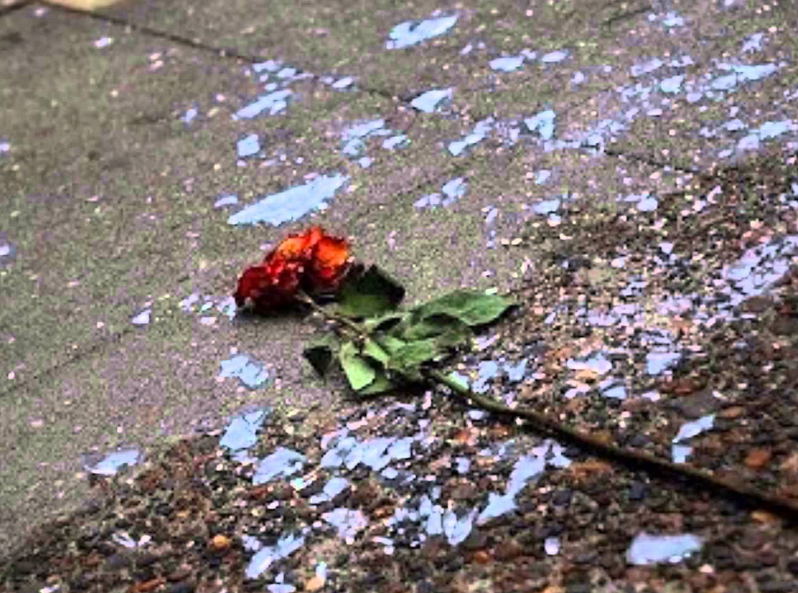[Table of Contents]
Previously: The Daily Seven (Chapter 1).
Her name was Grace, but she told me later that she was far from amazing and never attended church and showed me that she was not that graceful, starting with the way she wore her nubbed olive sweater inside out and carrying on lately with her clumsy gait, in which one foot seemed to be slightly more infirm than the other as she dragged her heels through the streets with a slight hobble, with the anemic pace now much louder on her billet’s hardwood floors, almost as if she had an undiagnosed case of Meniere’s, which seemed plausible given how loud the world had become, but I liked this about her, along with the fact that she didn’t wear makeup and she did not appear to give two fucks about keeping up appearances in the horrorshow real now known as New Amagaca.
She had a bold look in a city in which there was a significant gender imbalance favoring men. Most female singles latched onto the nearest gormless potbelly and, if they couldn’t land that, they would swipe their cards in gauche boutiques for pointless merch and hope that they wouldn’t be tagged and blipped by a bored and vengeful TSA man looking to blow up a human head when not molesting passengers who had the credits and the brazen audacity to travel in this hard new world. Her brown hair swooped in a sloppy beehive with stray graying strands dangling past her hanging earlobes, bedecked with the mandatory cubic zirconia earrings that all single women now had to don. Her crisp blue eyes had not entirely hardened, but these orbs were well on their way into turning cold and sociopathic like everyone else. Maybe she had collided into me because the universe that the Ruler could not kill still favored those who longed to carry on some compassionate legacy of what had once been lived before, before the American dream, or the unsustainable myth that passed for it, had been extinguished by the Ruler in favor of the new order.
She was five years younger than me, an age gap that neatly aligned with the government’s exacting seventy-two page pamphlet on how and who to copulate with. But the disparity in years had merely been a coincidence, much as a series of unlikely events had caused a bunch of white supremacist yahoos to firebomb the White House, followed by the Virginia Massacre that had killed ten thousand and the insurgency that had butchered countless more and the new front erecting tall lumbering spires and sinister checkpoints on every block in every city and the division of the populace by political taxonomy, some of us pushed into camps and others executed and still others dreading the day that they would surely be selected by the daily seven algorithm. Grace and I held hands only because we knew we’d be arrested by the pleasure police if we didn’t. We held each other from a more sincere place of common empathy because we instinctively felt that we were the only two souls who seemed to care about that poor orphaned boy beaten to a pulp by the bloodthirsty crowd.
As I wiped her dry thin lips of vomit with my soiled polka dot handkerchief, and as the bright Amagacan floodlights shot hard pink and lavender into the sky, I told Grace that I was a desert father and asked if she knew what that meant and she said that she did and she smiled a rare smile in this hellscape we had been complicit in allowing to happen and now had little choice but to live through and carry on, even though carrying on was akin to binging through the worst Netflix sitcom imaginable. Many sitcoms had been put into production under the Ruler (he believed that television was the cornerstone of Amagacan life), given sixty episode runs for the year instead of the former twenty-six so that singles had plenty of content to watch to get down with the chilling business to produce a steady stream of innocent babies who would grow up in this hellish new normal, most infants named after the Ruler and various sitcom characters because the government had done everything it could to destroy our collective imagination.
“Would you like some tea?” she said.
“Tea is hard to come by these days.”
“I have good Indian tea. It’s impossible to get tea from China. But I do have sugar and even milk smuggled from a Kansas dairy farm hording some of the remaining cattle. Please don’t report me.”
“I won’t.”
“Builder’s tea.”
“Isn’t that a tribute to the nightmare across the ocean?”
“It’s worse over there than here. Maybe this is the coldest spot in hell. Across the Pond, we used to say.”
“Not that either of us could visit there. You’d use your rations on me? You barely know me.”
“You’re not like the other singles. If you wanted to Netflix and chill, you would have made your move by now.”
“And if you wanted that, you would have turned on the stream and let the algorithm decide what sitcom we needed to watch so that we could get in the mood. So that makes two of us who still believe in something else.”
“I don’t want to love you.”
“I know.”
“I don’t know if I believe in love anymore.”
“Maybe all the hookups have killed the instinct.”
“I have some friends who have found love.”
“Yeah, but can you really love anyone anymore? When everyone is so cruel?”
“Not everyone. We should be careful.”
“You’re right.”
The two of us stripped down to our underwear just in case the pleasure police decided to conduct a raid on this section. The thin walls could not disguise the mechanical grunts and woeful moans of other singles in other billets memorializing the binge of a sitcom season, ensuring that their personal ratings would remain somewhere between four and five stars. In those days, you could still rate your neighbors. The government was initially more understanding of singles who could not find a hookup every night. The policy had been very bold and very new and everyone was still working out how and how often to fuck in order to placate the Ruler. Sometimes, Denise and I pretended to copulate after a game of backgammon just to nab a few peripheral ratings from neighbors, who often planted their ears to walls if they could not hookup that night. This provided more documentation that we could provide to the police and the magistrates if we were ever caught living in a friends without benefits manner. In the early days, two of my closest friends had been rounded up for being friends without fucking. And I knew that I was living dangerously in actually getting to know another single of the opposite gender, respecting her in the ancient three date way or the mature manner in which you cultivated a friendship with someone you didn’t hit it off with or, more daringly (and more frequently in my case), never viewed her as a sexual object at all but as a dependable compadre.
“What’s that scar?” I asked, pointing to the ruddy encrusted trail on her left shoulder.
“A previous hookup. He got a little wild with a knife.”
“I’m sorry.”
“Don’t be. I’ve had worse. But the others didn’t leave permanent marks.”
The kettle hissed with a blissful whistle and she poured the water and the milk and the sugar into two mugs, with the dangling string from the teabags leaving a cracked matted line against the porcelain. She placed the two mugs on the white government-issue plastic table common to all single billets.
“This is nice,” I said. “Thank you.”
“Thank you for not asking me to Netflix and chill.”
“Do you remember when they singled out men who had abused women? That had been in the last days. Film producers, famous actors.”
“But not politicians. Not the President.”
“No.”
“We directed our energies towards entertainment rather than politics. Some men in power suffered, but the real men in power triumphed and helped make this happen.”
“And we lost that last election.”
“Are you okay talking about this?”
“Honestly, after what I saw today.”
“It now happens every day.”
“That doesn’t mean it disgusts me any less.”
“Do you want to live?”
“There are some days that I don’t.”
“Do you think it will pass?”
“I don’t know. But humankind survived the Middle Ages. So I suppose anything is possible.”
“It’s nice talking like this. Reminds me of the old times.”
“Shouldn’t we get down to business?”
“I suppose so. Would you like to pretend or be real?”
“I’d rather pretend because you seem very nice.”
We knew when our neighbors pretended to fuck and we were careful to rate them even when we didn’t like them or their performances were weak. We needed to rate our conquests to help the daily seven algorithm because you would get docked one star if you failed to rate a hookup within twenty-four hours. And it was important to hookup on a somewhat regular basis to ensure that you had a somewhat regular rating. You could usually get by on one hookup every two weeks. That would keep you hovering around 3.5, a fairly safe rating that would usually keep you from not being selected for the daily seven, but this assumed that your partner wasn’t sour or vengeful and was understanding with you even if neither of you had any physical chemistry together. This listlessness in matters of the flesh was happening more and more these days as fucking became more regular and soulless and people couldn’t find pleasure even when they were told about crops and rope and handcuffs and blindfolds. We were sent daily seduction tips, often featuring interactive maps outlining directions to the clitoris with sultry hip-hop music playing beneath the alluring graphics, to ensure that all would be satisfied in New Amagaca. Some citizens had been profiled in the news feeds as studs and sluts. A small number had become pornographic stars, singled out for their athletic contributions that the tastemakers had liked and favorited on the social networks. This was one way you could survive under the new regime if you didn’t want to work the assigned labor. YouTube now only enabled monetization for singles who were willing to confess to the world how they were fucking. So the system was rigged to favor the prolific and more adventurous hookup practitioners. But you couldn’t live like this forever. Because as you grew older and your looks faded, your life could be derailed and your rating might falter if you didn’t find a partner and go to city hall and get the stamp from the alderman and the notary formally memorializing how you had switched from single to married status, although this was by no means guaranteed and it was useful to make sure that your partner was pregnant. If you were not heteronormative, which was the orientation that the Ruler tended to publicize, you could be one of those singles playing the hookup game well into your forties and fifties, although that was more difficult. If you were not heternormative, you could, in theory, adopt one of the many children who had been left by a daily seven single parent. But the government only granted you non-heternormative marriage if you were willing to take in a minimum of six orphans. And it was hard enough to survive with the average 2.2 children. Because of this, the algorithm often selected orphans for the daily seven. Because the algorithm knew best and could often detect if an orphaned child had no prospects, not even among the non-heteronormative types. And you could not talk about any of this because it happened swiftly and it was all deleted from the search engine results even quicker and you had only your fallible memory to rely upon.
“What’s your name again?” asked Grace.
“Alex.”
“Alex, let’s pretend.”
“Okay. We should probably move to your bed.”
“I chose a bedroom without any windows.”
“Smart. I know drones that fly outside windows to corroborate hookups.”
And the two of us scampered underneath the white duvet. It was getting cold and I saw goosebumps sprout on Grace’s bare arms and I made sure she was covered. And we lay next to each other, snickering a little bit to ourselves, and we began to howl and fake our orgasms. We had taken the batteries outside of our phones and placed them in the freezer so that the government would not capture any AV, but, when we turned our phones back on after our performance, we heard the blips of favorable five star approvals from our neighbors, who had rated us strictly on our sounds. And the two of us laughed and high-fived over our convincing performance and we soon fell fast asleep, hoping to survive another wretched tomorrow. And I began to like Grace a little more.
4245 / 50000 words. 8% done!
Next: We’ll Always Have Brunch (Chapter 3)




